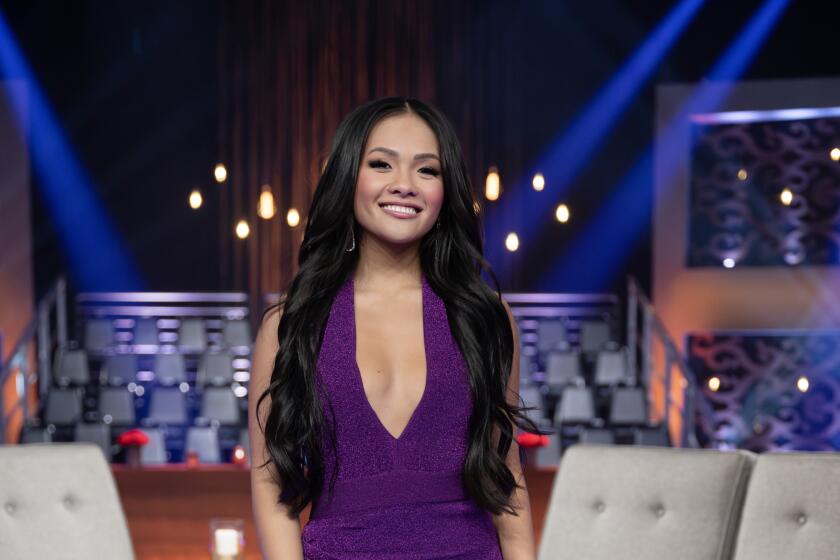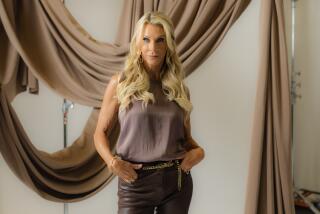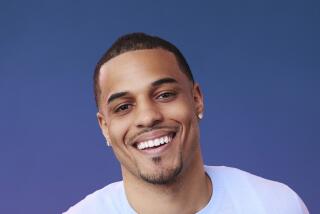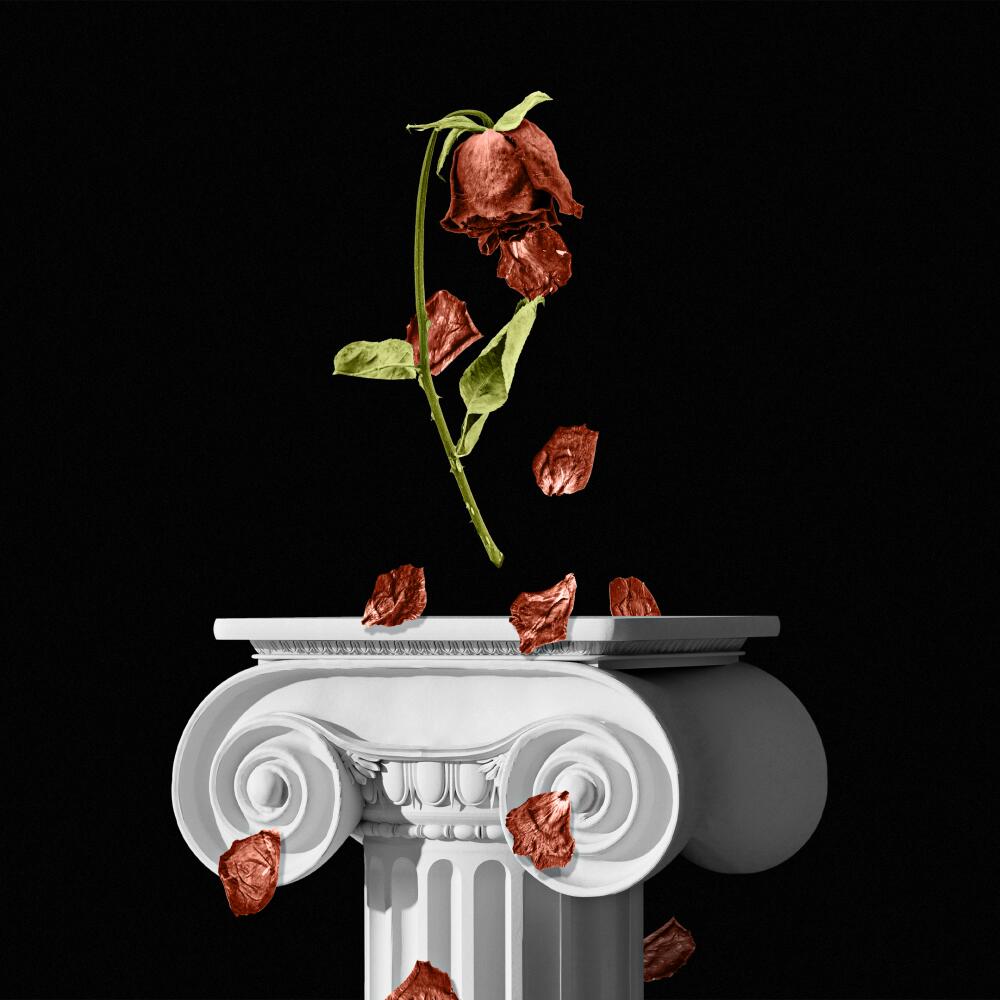
- Share via
The team of executive producers from ABC’s “The Bachelor” had a lot to celebrate when they appeared at a panel during the Television Critics Assn. winter press tour in February. They were eager to highlight the veteran franchise’s winning streak over the last few years.
“The Golden Bachelor,” the spin-off focused on older adults looking for love that starred 72-year-old widower Gerry Turner, was a solid hit. The network had just announced pickup of “The Golden Bachelorette.” Charity Lawson, the most recent “Bachelorette,” got engaged. Season 28 of “The Bachelor,” with hunky tennis instructor Joey Graziadei, was also performing well.
With its gorgeous exotic locations, charismatic leads and rose-colored romance, the franchise was firing on all cylinders. “It’s just about telling true, authentic love stories and hoping that the journey to get there is engaging, entertaining and compelling for the audience,” executive producer Claire Freeland said.
But one question punctured the upbeat vibe.

Subscribers get exclusive access to this story
We’re offering L.A. Times subscribers special access to our best journalism. Thank you for your support.
Explore more Subscriber Exclusive content.
“Why does it seem that ‘The Bachelor’ and ‘The Bachelorette’ have such a hard time dealing with racial issues in-depth?” asked National Public Radio‘s television critic Eric Deggans, referencing the fiery controversies surrounding the first two Black leads — Rachel Lindsay and Matt James — that culminated with both personalities bolting from the franchise.
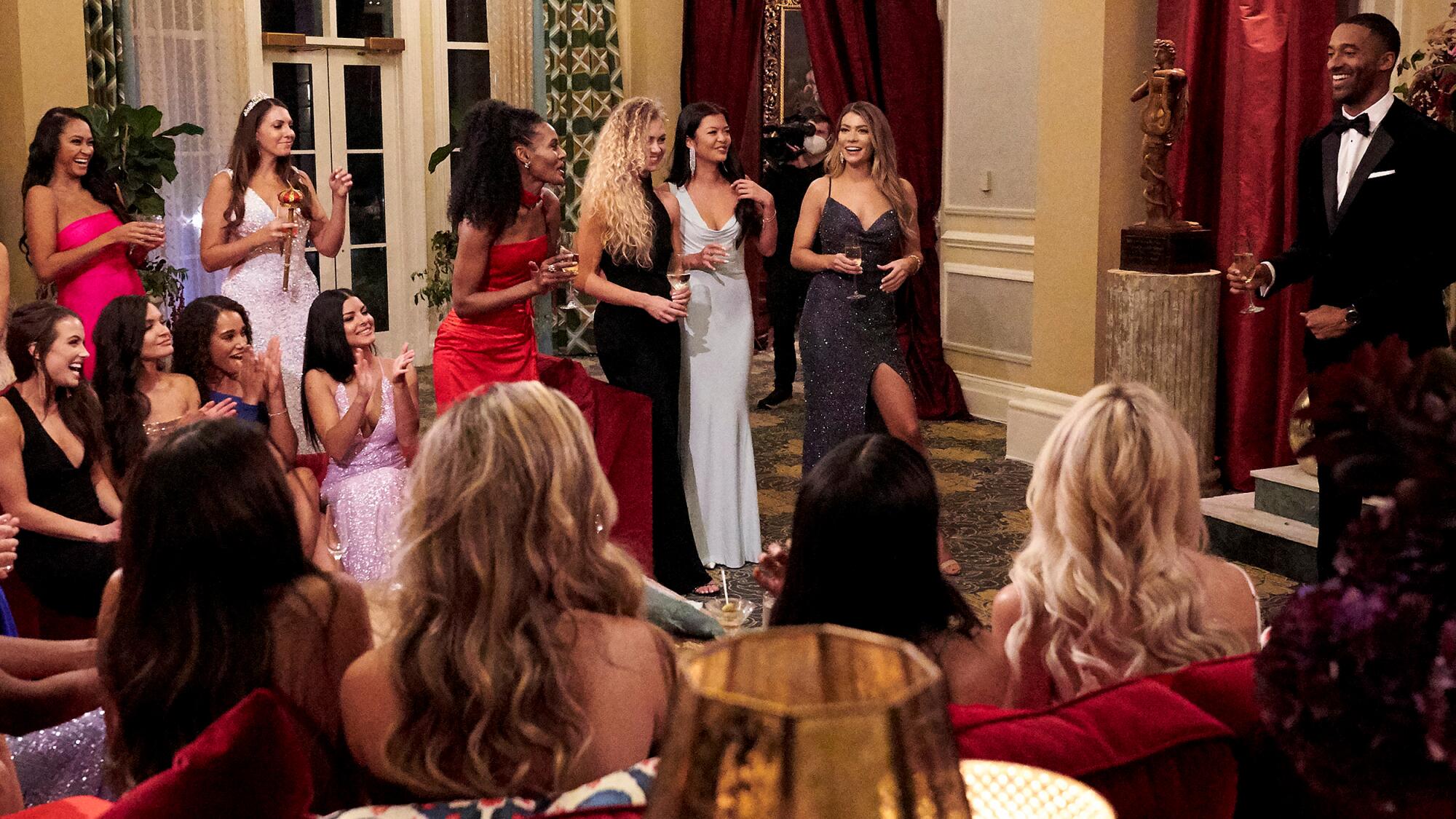
Attempting to shift the focus from the past, Freeland responded, “I can speak to where we are now.” But Deggans continued to press: “That doesn’t really answer the question. Why has ‘The Bachelor’ struggled to deal with race, particularly when Black people are the stars of the show?”
Freeland and her colleagues, Bennett Graebner and Jason Ehrlich, froze. After about eight seconds of silence, Deggans quipped, “I guess we have our answer.”
The “frozen moment” became one of the buzziest stories out of the press tour, casting another harsh spotlight on the stormy history of racism and cultural insensitivity that has clouded “The Bachelor” franchise — one of TV’s most enduring and popular brands — since its 2002 premiere.
It was “the silence that seemed to speak volumes,” Deggans later wrote. “... The show’s producers have never found a way to grapple with how white-centered the show is, how difficult that centering makes it for people of color who appear on the program and how that failure leaves them unable to respond well when problems involving racial issues arise.”
The controversy that erupted around the series this week drew in contestant Rachael Kirkconnell, host Chris Harrison and former “Bachelorette” Rachel Lindsay.
The turbulent track record of the franchise includes the bullying of contestants of color, a lack of Black male leads — James remains the only Black Bachelor to be cast — and spotty vetting that allowed contestants who had posted racially offensive content on social media to appear on the show. In addition to James and Lindsay, Michelle Young, who starred in Season 18 of “The Bachelorette,” was unhappy with a series of diversity-related issues, and she said during a podcast interview that she had threatened to quit at one point because of her frustration with producers.
Freeland had wanted to emphasize at the press tour how the casts in the last few years had become much more diverse, and how the two flagship shows had featured more conversations revolving around race.
But despite those promising signs, recent incidents — the fierce online bullying by fans of a mixed-race finalist on “The Bachelor” and a casting shortfall on the upcoming season of “The Bachelorette” — point to a continuing struggle behind the scenes to right the wrongs. Whether the franchise can establish credibility and get beyond its toxic past remains an open question.

Freeland is a veteran of the Canadian version of “The Bachelor,” joining the American mothership last year, and Graebner has been with the series since 2008, becoming an executive producer in 2015. Freeland and Graebner are now stepping forward, declaring a commitment to meaningful change. They agreed to meet with The Times, and in an interview at ABC’s offices in Burbank, they expressed regret about their response at TCA, acknowledged the franchise’s past mistakes when it comes to race and pledged to steer “The Bachelor” and “The Bachelorette” into a more inclusive era where cultural diversity is embraced.
“It’s hard to say out loud, that people of color didn’t see themselves represented, that they did not see ‘The Bachelor’ franchise as a safe place,” Graebner said. “We didn’t have a Black lead in this franchise for 15 years, and that’s inexcusable. It created a vicious cycle, and it’s taken a lot of work to get back to a place where we feel at least we’re working for the positive.”
A few days earlier, the two producers, who are also the showrunners of “The Bachelor” and “The Bachelorette,” had wrapped production on the upcoming season of “The Bachelorette,” premiering July 8, which features Jenn Tran as the first Asian lead of the franchise.
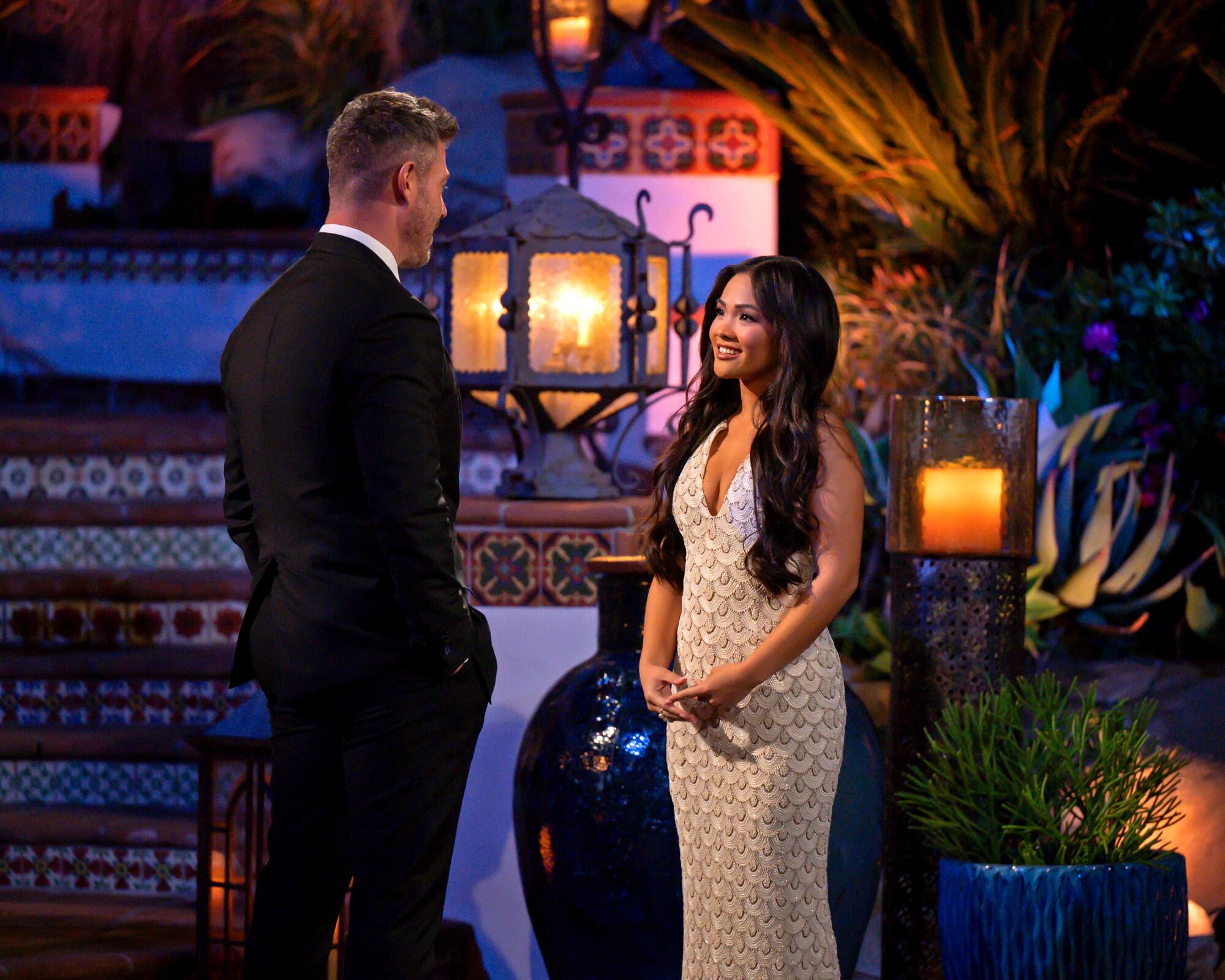
“The core value to this show is that everybody deserves to find love, regardless of race, ethnicity, background, faith,” Freeland said. “The only way we can do that in a truly fulsome way is to have people on the show that reflect the country we live in.”
It’s not the first time promises have been made by the show and its producers to reverse the problematic narrative on their cultural missteps. In solidarity with the Black Lives Matter movement, executive producers in 2020 released a statement: “We acknowledge our responsibility for the lack of representation of people of color on our franchise and pledge to make significant changes to address this issue moving forward.”
What followed was the most tumultuous season in franchise history.
After James was cast in 2020, his stint became embroiled in controversy when photographs surfaced of contestant Rachael Kirkconnell at an antebellum South-themed party.
Although he and Kirkconnell eventually wound up together — she won the season and they remain a couple — James later accused the producers of failing him, betraying their promise to show him as an accomplished young Black man who had overcome many personal and professional challenges.
Then-host Chris Harrison defended Kirkconnell in a combative interview with Lindsay on “Extra,” where she was a correspondent, which stoked the controversy only further and eventually led to his exit from the franchise after nearly 20 years.
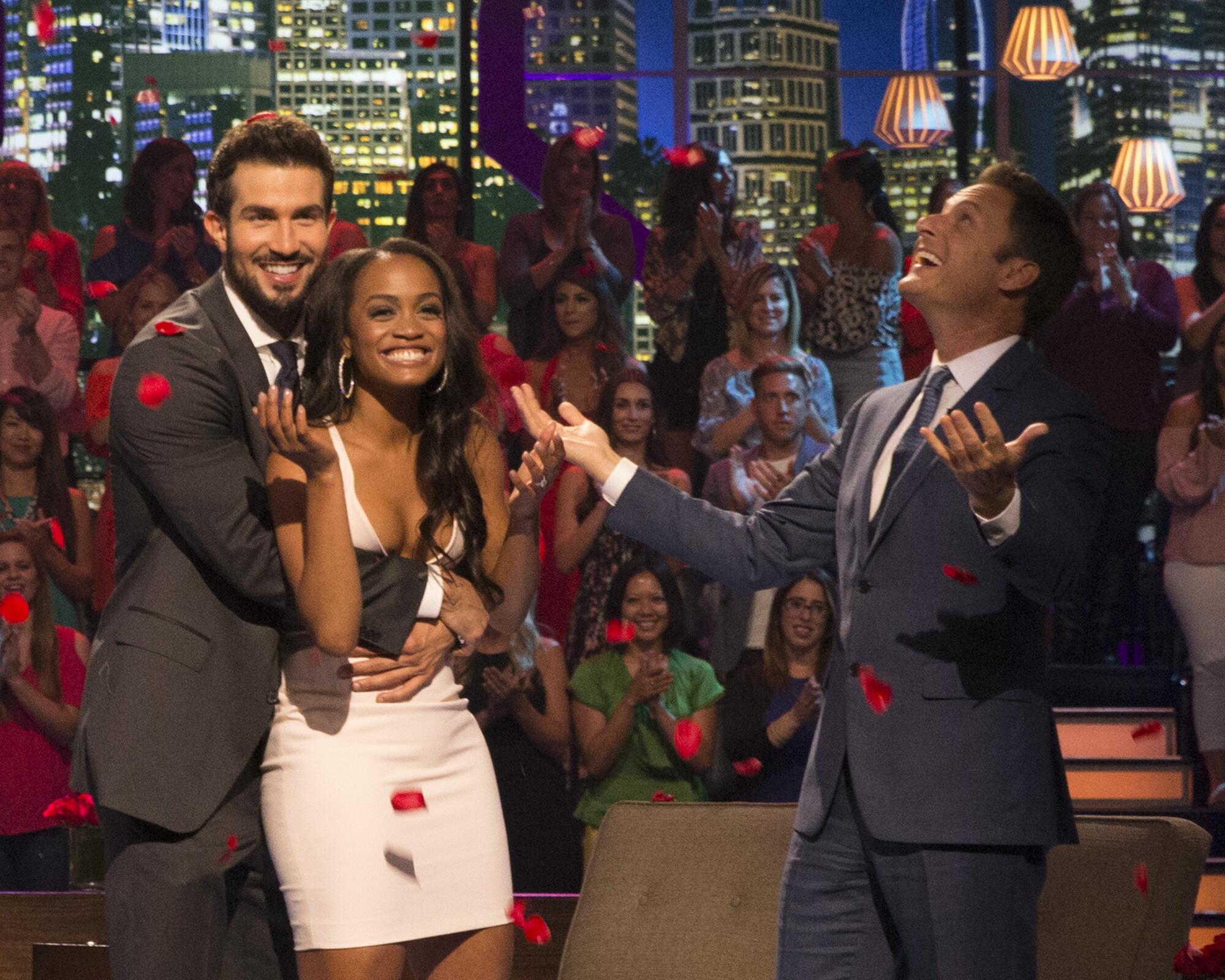
“I’m going to be really frank — we let Matt down,” Graebner said. “That season went wrong on so many levels. We did not protect him as we should have. The finale of that season was the darkest day I’ve had on this franchise. Here was this great Black man, and we should have been celebrating his love story. Instead, what we saw was a man burdened and overwhelmed by issues of racism. It was really sad for me personally.”
Freeland and Graebner said it is a “priority” to cast a Black Bachelor in the near future, although they did not specify when, and to correct the mistakes made during James’ season. Graebner added that the production “didn’t have the same resources then that we have now.”
The shows have two licensed therapists — one who is a person of color — embedded with the production. Noted diversity and inclusion consultant Kira Banks is also available to producers and cast members.
While the franchise has been accused of tokenism — casting only a few people of color, who usually were quickly eliminated — in the most recent seasons of “The Bachelor” and “The Bachelorette,” including the upcoming season in July, more than half the cast comes from “underrepresented racial and ethnic backgrounds,” Freeland said.
But while the duo project a sincere desire for change, demonstrating to audiences and contestants that “The Bachelor” franchise is a welcoming experience for people of color has been an elusive goal.

During “The Women Tell All” episode of the last season of “The Bachelor,” Rachel Nance, whose mother is Filipino and father is Black and Arab, tearfully described her trauma after the airing of a Hometown episode where Graziadei visited her family.
“I got a lot of hateful messages ... calling me the N-word or jungle Asian, all because I got a rose,” Nance said. “It’s sad because my parents really enjoyed the Hometown episode, and for them to see people attacking our culture and attacking me — I’ve been in this scenario before, but this was like a whole new level. Hundreds of people messaging me. TikToks of people throwing up when [Joey and I] were kissing.”
Jesse Palmer, the host of the franchise, said softly to Nance, “I’m so, so sorry that you and your family had to go through that.” But instead of using the segment to address Nance’s devastation or denounce the racist nature of the attacks, Palmer quickly pivoted, addressing her fellow contestants and franchise alumni in the audience: “Ladies, show of hands if you’ve had a hateful comment or statement on social media.”
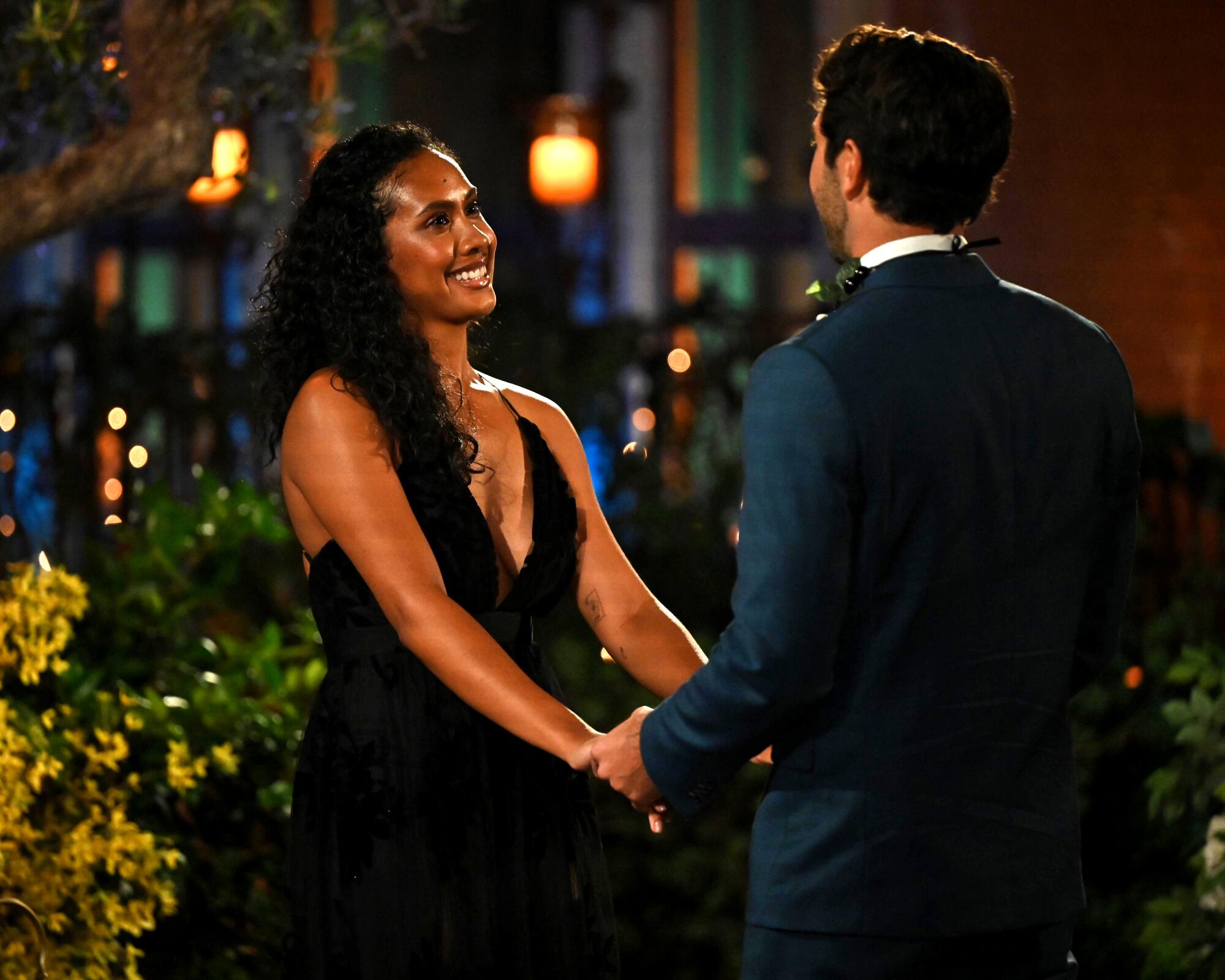
He added, “Here’s the thing, Bachelor Nation. We love your strong opinions But I think it’s so important we uplift these women who are brave enough to be vulnerable and share their stories.”
Asked about the show’s handling of Nance’s segment, Freeland said, “We have reflected on it, and a big blind spot was not naming what it was: racism. That was another missed opportunity for us. Our intention was to bring light toward what Rachel was going through. But we have to do better.”
“We’re not always going to get it right,” Graebner added. “We’re going to make mistakes as we move forward. But we’re not going to shy away from difficult conversations.”
And while the casting of Tran, who is Vietnamese, in “The Bachelorette” represents an important milestone, the near-absence of Asian American suitors in the cast may spark more controversy.
‘The Bachelorette’ has finally named its first Asian lead: Jenn Tran. She will embark on her own journey for love after pursuing ‘Bachelor’ Joey Graziadei.
“That’s on us. We didn’t do what we needed to do,” Graebner said, acknowledging the lack of Asian representation not just on the cast, but in the franchise overall. “Our hope is that they will see Jenn and realize this is a safe space. We’re not saying it will solve and fix everything. But it is a step.”
Much of “The Bachelorette” season will have intense conversations about race and faith, Freeland said, which she is excited for people to watch.
“We had extensive discussions with Jenn prior to filming,” Freeland said. “She is proud of her Vietnamese culture, and she wanted to know if she could speak about that. We told her we wanted her to be her most authentic self.”
Still to be seen is whether Tran will be targeted like Nance was by the increasingly vocal legion of Bachelor Nation on social media that has been resistant to embrace contestants who are not white.
Graebner said those fans will likely not be happy with their shift to a more inclusive show. And it isn’t the producers’ prerogative to convince them.
“We can’t change the minds of people who aren’t interested in this new direction. What we have the power to do is change the program,” Freeland said. “There’s a reason why this show has been around for 20 years. The dream and desire for true love will never go out of style. We hope that people can look at the last couple of years and see that we are intending and taking steps to make the change.”
“We know we’re not there,” Graebner added. “We have a long way to go. But we’re committed to getting there. If you don’t want to see a Black love story, an Asian American love story, an interracial love story, then maybe Bachelor Nation isn’t for you.”

